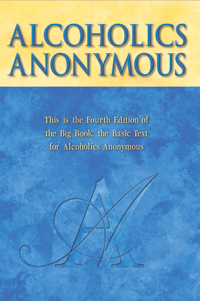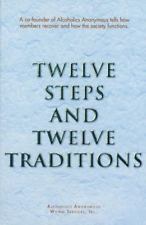


Uses of 'will', in terms of human power or character, almost always indicate it is negative or insufficient. Uses of 'will' to describe Step Three ('Turning our will and life over...') are excluded here. A few positive uses of will / will power are at the bottom of the page. |
 |
"Faced with this problem, if a doctor is honest with himself, he must sometimes feel his own inadequacy. Although he gives all that is in him, it often is not enough. One feelsthat something more than human power is needed to produce the essential psychic change."
The Doctor's Opinion
"It relieved me somewhat to learn that in alcoholics the will is amazingly weakened when it comes to combating
liquor, though if often remains strong in other respects."
Page 7, Bill's Story
"But my friend [Ebby] sat before me, and he made the pointblank declaration that God had done for him what he
could not do for himself. His human will had failed. Doctors had pronounced him incurable."
Page 11, Bill's Story
"Why can't he [the true alcoholic] stay on the water wagon? What has become of the common sense and will power he sometimes displays with respect to other matters?"
Page 22, There is a Solution
"In a vague way their families and frineds sense that these drinkers are abnormal, but everybody hopefully awaits the day when the sufferer will rouse himself from his lethargy and assert his power of will.
"The tragic truth is that if the man be a real alcoholic, the happy day may not come. He has lost ontrol."
Page 25, There is a Solution
" The fact is that most alcoholics, for reasons yet obscure, have lost the power of choice in drink. Our so-called will power becomes practically nonexistent. We are unable, at certain times, to bring into our consciousness with sufficient force the memory of the humiliation of even a week or a month ago. We are without defense against the first drink. "
Page 24, There is a Solution
"Young people may be encouraged by this man's example to think that they can stop, as he did, on their own will power. We doubt if many of them can do it, because none will really want to stop, and hardly one of them, because of the peculiar mental twist already acquired, will find he can win out."
Page 33, More About Alcoholism
Jim the accountant, just before his relapse in Washington: "I reasoned I was not so far advanced as most of you fellows, that I had been usually successful in licking my other personal problems, and that I would therefore be successful where you men failed. I felt I had every right to be self-confident, that it would be only a matter of excercising my will power and keeping on guard."
Page 40, More About Alcoholism
Just after Jim's relapse: "I knew from that moment that I had an alcoholic mind. I saw that will power and self-knowledge would not help me in those strange mental blank spots."
Page 41, More About Alcoholism
"Our human resources, as marshalled by the will, were not sufficient[to overcome alcoholism]; they failed utterly."
Page 45, We Agnostics
"Show him [a new prospect], from your own experience, how the queer mental
condition surrounding that first drink prevents normal functioning of the will power."
Page 92, Working With Others
"'Oh no,' said my friend, 'this chap is either through with liquor, or he is minus a job. If he has your will power and guts, he will make the grade.'
"I wanted to throw up my hands in discouragement, for I saw that I had failed to help my banker friend understand. He simply could not believe that his brother-executive suffered from a serious illness. There was nothing to do but wait."
Page 138-9, To Employers
"Can you discard the feeling that you are dealing only with habit, with stubbornness, or a weak will? If
this presents difficulty, re-reading chapters two and three, [There Is A Solution and More About Alcoholism] where alcoholic sickness is discussed at length might be worth while."
Page 140, To Employers
Related:
Big Book:
"These men were not drinking to esca pe; they were drinking to overcome a craving
beyond their mental control."
The Doctor's Opinion
"So he [Roland H.] returned to this doctor [Jung]. whom he had admired, and asked him point-blank why he could not recover. He wished above all things to regain self-control."
Page 26, There is a Solution
"About the businessman who remained dry for 25 years, then brought out his carpet slippers and bottle: "In two months he was in a hospital, puzzled and humiliated. He tried to regulate his drinking for a while, making several trips to the hospital meantime. Then, gathering all his forces, he attempted to stop altogether and found he could not."
Page 32, More About Alcoholism
"Neither could we reduce our self-centeredness much by wishing or trying on our own power. We had to have God's help."
How It Works, Step Three
12 & 12:
"No other kind of bankruptcy is like this one. Alcohol, now become the rapacious creditor, bleeds us of all self-sufficiency and all will to resist its demands."
Page 21, Step One
"Our sponsors declared that we were the victims of a mental obsession so subtly powerful that no amount of human willpower could break it. There was, they said, no such thing as the personal conquest of this compulsion by the unaided will... It was a statistical fact that alcoholics almost never recovered on
their own resources.
Page 22, Step One
"By now, though, the chances are that he [the newcomer] has become convinced that he has more problems than alcohol, and that some of these refuse to be solved by all the sheer personal
determination and courage he can muster... His lone courage and unaided will cannot do it. Surely he must now depend upon Somebody or Something else."
Page 39, Step Three
" 'Sure, I was beaten, absolutely licked. My own willpower just wouldn't work on
alcohol.'"
12 & 12, Page 63, Step Six
"When they [instinctual drives] drive us blindly, or we willfully demand that they supply us with more satisfactions or pleasures than are possible or due us, that is the point at
which we depart from the degree of perfection that God wishes for us here on
earth. That is the measure of our character defects, or, if you wish, of our sins."
12 & 12, Page 65, Step Six
Positive uses of Will / will power:
"Every day is a day when we must carry the
vision of God's will into all of our activities. "How
can I best serve Thee--Thy will (not mine) be done."
These are thoughts w hich must go with us constantly.
We can exercise our will power along this line all we
wish. It is the proper use of the will."
Big Book, Page 85, Into Action, Step Ten
"Then it is explained that other Steps of the A.A. program can be practiced with success only when Step Three is given a determined and persistent trial. This statement may surprise newcomers who have experienced nothing but constant deflation and a growing conviction that human will is of no value whatever. They have become persuaded, and rightly so, that many problems besides alcohol will not yield to a headlong assault powered by the individual alone. But now it appears that there are certain things which only the individual can do. All by himself, and in the light of his own circumstances, he needs to develop the quality of willingness. When he acquires willingness, he is the only one who can make the decision to exert himself. Trying to do this is an act of his own will. All of the Twelve Steps require sustained and personal exertion to conform to their principles and so, we trust, to God's will.
"It is when we try to make our will conform with God's that we begin to use it
rightly. To all of us, this was a most wonderful revelation. Our whole
trouble had been the misuse of willpower. We had tried to bombard our problems
with it instead of attempting to bring it into agreement with God's intention
for us. To make this increasingly possible is the purpose of A.A.'s Twelve
Steps, and Step Three opens the door."
12 & 12, Page 40, Step Three
"The real tests of the situation are your own willingness to confide and your
full confidence in the one with whom you share your first accurate self-survey.
Even when you've found the person, it frequently takes great resolution to
approach him or her. No one ought to say the A.A. program requires no
willpower; here is one place you may require all you've got. '
12 & 12, Page 61, Step Five
"All of us, without exception, pass through times when
we can pray only with the greatest exertion of will."
12 & 12, Page 105, Step Eleven